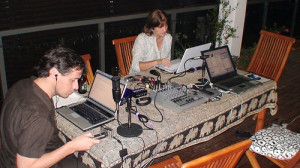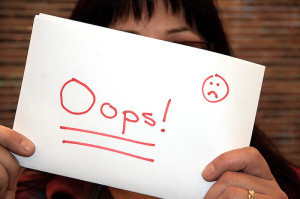Eric Dontigney's Blog, page 7
July 17, 2014
Hubris Is Not a Bad Thing For Writers…Except When It Is

photo credit: nWoSyxx via photopin cc
In most situations, hubris is catastrophic. It leads you to overestimate your competence, which undermines your credibility. This inevitably leads to job problems and, potentially, to problems in your personal life as well. For writers, though, hubris may not be such a bad thing. In fact, it might be essential for aspiring novelists.
Slaving away in solitude for months or years, depending on your process, requires a special kind of arrogance. You need to believe, deep down, almost zealot-like, that you are writing something extraordinary…something people will want to read…something that people will want to spend money on. Devoting that kind of time and energy to a project, especially for indie authors and first-time novelists who lack a fan base to shore up their egos, in short, requires hubris.
You need overweening pride in yourself, in your work, in your imagination and there is nothing wrong with that. Without that hubris in play, most books would go unwritten or unshared. You can’t do without it and you shouldn’t try. The problem with necessary hubris, and you had to know a problem was coming, turns up after you finish the first draft.
That same hubris that let you sustain the work can also lead you to believe that it doesn’t need the attention of an editor, or that the novel doesn’t have structural issues, characterization issues or simple language issues. You are, of course, wrong about that. No matter how well-crafted your novel’s first draft is, it needs work. Always. Period. Do not pass Go; do not collect your Pulitzer.
The hardest part of being a writer is seizing your hubris by the tail and hauling it in once the writing is over and the revisions begin. You need to be able to put away the pride and look objectively at the work. If this sounds a bit schizophrenic, well, it is. You’re a writer. Get used to cognitive dissonance. It’s what you signed on for. Think of your hubris like a tool. Not every tool is right for every job. Hubris is a tool for sustaining the process. Objectivity is the tool for seeing it through to the end.
July 5, 2014
The Difficulties of Writing a Novel Organically

photo credit: rthakrar via photopin cc
Writing novels is hard work. Everyone who thinks otherwise is either not trying hard enough or has never tried it at all. None of which to say writing novels isn’t fun. It is, with the possible exception of some manga series and Aaron Sorkin’s run of scripts on The West Wing, the most expansive form of fiction a writer can embrace. You get to take all the space you need to tell the story you want to tell. That is incredibly liberating, but can also be problematic for an organic writer like me.
I don’t like outlines. I never have. I used to drive my professors crazy in college with my obstinate refusal to write them. Seriously, unless I was looking at a full letter grade drop on a paper, I just didn’t do them. For me, outlining is a lot like giving myself spoilers for the whole book.
Once I know, I mean really KNOW, how it’s going to turn out, I lose fire for the story. It becomes an exercise in following instructions (even if they are from me, to me) and nothing sucks the joy out of writing faster – for me – than extensive directions.
So, when I go to write a novel, I don’t outline. At most, I try to have an idea of where the novel needs to end, in general, and then I write. Granted, I try to write in a way to aims at that end point, but the rest is a mystery. The whole process becomes one of discovery for me, which I find exhilarating and fun.
Writing a novel that way does, however, pose difficulties. For example, I never know how long it’s going to be, which means I can’t anticipate how long it will take to write. I find out how long the book will be when I write the last sentence. That makes it very difficult to make announcements about when the next book is going to come out, since I have to finish before I know how long edits will take.
That uncertainty proved especially problematic as I worked on the latest installment of my Sam Branch series. I wrote and I wrote and I wrote. The page count swelled to 250 pages. Then it went to 300…350…400. Just before I got to the 400 page mark, I was living in active fear.
I literally didn’t know how the book was going to end or, at least, not how to get the characters there, with over 100,000 words already written. Fortunately, insight hit and I managed to wrap it up around the 450 page mark, but it was still huge. In fact, in my head, it had swelled to monstrous, unwieldy size.
Surely it couldn’t hold the attention of readers at that length. Surely, it must be bloated with useless, unnecessary words, sentences, paragraphs and scenes. Had I, setting out with the best of intentions, spent the better part of a year writing 450 pages of crap that I would need to throw out?
My lack of an outline also denied me the comfort of knowing that I had stayed on task. All the assurance I had were my instincts that the book was written to the length it needed to be. No longer. No shorter. As it turned out, my fears were the only things bloated beyond all proportion or reason. My alpha readers all enjoyed the book, festooned with typos and grammatical errors though it was.
While I firmly believe my novels are better without outlines…since I quite probably wouldn’t write them if I wrote outlines…it makes it hard to play fair with readers. I can’t tell them things they want to know, because I sincerely have no clue. Of all the difficulties of writing organically, I find that one the hardest.
June 13, 2014
When Is It Time to Quit on a Story, Character, or Book?

photo credit: Joao Ferrao dos Santos via photopin cc
Every writer of books is plagued by stories of how some author submitted a novel to 30 or 40 or 57 agents or publishers before finding it a home, only to go on to experience huge, decades-spanning success. It makes us wonder if we should be submit that story or novel to just one more place, because this next place could be the one that says yes. While I can’t give you any hard and fast rules about this –there is no equation — I do think there comes a time when we need to abandon old projects for new ideas. Here are my general parameters.
You’ve Been Trying for More Than 5 Years
I have this one story that I’ve been going back to, revising, tweaking, and editing for more than ten years. I’ve submitted it to dozens of magazines and it has been universally rejected. I’ll be honest. It breaks my heart a little that I never found a home for that story. I think it’s probably, on balance, one of the most powerful and well-written things I’ve ever done. But, after ten years and so many revisions I cannot count them anymore, I’m retiring that story from active submitting. It will, however, probably see life in some other context.
You’re Bored
Granted, every writer gets bored at some point during the writing process. It happens. That’s not what I mean. What I’m talking about is that moment where you realize that you’re phoning it in because you just don’t care about the story or characters anymore. When you stop caring, it’s time to let that idea go, because reader boredom won’t be far behind.
People Who Know Are Telling You It’s Bad
It’s a hard thing to hear that an idea is bad or a story doesn’t work or a novel isn’t compelling. The only thing worse than that is to push forward with it anyways. If one person tells you it’s bad, you can probably blow it off. If your writer’s group, your friends, an agent and an editor all say it’s bad, put that one in your drawer and forget about it. The odds that all of those people are wrong are infinitesimally low.
There may be other times when you should quit, like if it’s impacting your health, but the above three three are the times that I believe you should always quit and move onto a new idea. Sometimes, no amount of effort or revision can save an idea and absolutely nothing can save a book from the author’s boredom.
Do you have any personal guidelines for when to abandon an idea, book or character? Let me know about them in the comments below.
June 5, 2014
So, have you written anything I might have read?

Image courtesy of graur codrin / FreeDigitalPhotos.net
I expect that everyone with the raw nerve to proclaim themselves as writers have faced this question. On the one hand, it’s inevitable. On the other hand, it’s frustrating. If you take the question at face value, the answer should be: “How the hell should I know?” Asking a comparative stranger to judge, based on a few minutes of interaction, whether you might have read what they’ve written is, of course, absurd (unless the writer is Sherlock Holmes).
Sadly, though, what they are really asking is something more pernicious and, frankly, harder to swallow. The question they mean to ask is, “Have you written something that is famous enough that I might have heard of it?” The answer to that question is, in almost all instances, for almost all writers, “No.”
There are maybe a few dozen writers who have name recognition in popular culture, although sometimes their books or characters are famous when they are not. The rest of us chip away in relative obscurity. The problem with uttering that magical phrase, “I’m a writer,” is that it doesn’t actually communicate what most of us do.
After all, the person writing dialogue for your favorite TV show is a writer. The people crafting the slogans in the commercials that interrupt your favorite TV show are writers. So are the people writing the novels you read, the textbooks you study, the blogs you read instead of working, and articles in your favorite topical magazine or e-zine, depending on your tech- savvy.
This is, no doubt, why so some writers do not self-identify as writers, but as the kind of writing they do. They say, “I’m a novelist,” or, “I’m a blogger,” or, “I’m a journalist,” or, “I’m a copywriter.” Which is all well and good, if that’s all you do. But what about those people who are, at turns, novelists and bloggers and freelance article writers for magazines. By what name should they identify themselves? With no better options, they call themselves writers.
Since we have no better option than to call ourselves writers, I suggest that what we need is a better answer to the question, “Have you written anything I might have read?” Rather than hem and haw and, eventually, admit that the answer is probably not, we should say the following. “I’m not sure, but if you haven’t, you should.” Then, give them the name of your latest novel or offer to send them a link to something you’ve written.
Of course, the odds are good that, even if they agree to let you send them a link or write down the name of your latest book, they won’t read your work. But, a few of them probably will. If they like it, they’ll probably tell their friends and that is how you get some word of mouth moving. Since the thing that most writers lack is an audience and we can’t depend on other people to give us one, we have to take matters into our own hands. This is one way to do that.
May 19, 2014
Webinars, Writing and Delivering on Your Promises

photo credit: sridgway via photopin cc
Most of the time, I try to talk directly about things to relate to writing, indie author marketing, branding and so on, but I had an experience watching webinars a couple weeks ago that I want to relate because it’s about delivering on promises. In a roundabout way, though, my experience does relate to the broader topic of writing and marketing because those are also about delivering on promises
So, a couple weeks ago, I watched two webinars. For those of you who aren’t familiar with webinars, they are effectively live webcasts that typically feature an expert or two speaking on a topic with the aid of slides. One of the webinars I watched was about inbound marketing and the other was about a piece of writing software called Scrivener. The experience of watching these two webinars could not have been further apart.
The inbound marketing webinar, sponsored by Hubspot and featuring marketing expert John Jantsch, was what I would consider a textbook example of how to do a webinar. Jantsch delivered a structured talk with supporting infographics, charts and explanatory slides. He moved smoothly from topic to topic and wrapped up his talk in approximately 42 minutes. For remaining time, Jantsch fielded moderator-selected questions to which he gave very cogent answers.
The Scrivener webinar was hosted by Joel Friedlander and featured presenter Joseph Michael, the self-styled Scrivener Coach, and a moderator. This webinar was, by most measures, a hot mess. The purported purpose of the webinar was to show people how to use Scrivener to write in Scrivener and then export files into ebook formats…effortlessly.
From the outset, it was clear that this webinar was being delivered off the cuff, with minimal preparation or thought given to structuring the content for maximum value. They was a lot of valuable time bouncing control of the screen between the presenters. The content itself came across as a tour of features that the presenters liked, rather than the promised tutorial.
A major low point for me came when one of the presenters attempted to walk the other one through a new process for saving research material. While no doubt a valuable tip, it could have been shown to viewers in under 60 seconds, instead several minutes, if they practiced it prior to the live webinar.
By then, I was ready to bail and go do something productive. However, at the beginning of the webinar, they promised that 50 attendees would get a chance at a free copy of Scrivener if they stayed until the end. So, I stuck it out. I figured that another 20 minutes for a chance at free software was a small enough price to pay. Only, things didn’t work out quite as advertised…
When the ended and the obligatory product pitch commenced, a standard feature of webinars, we find out that the only way to get a “free” copy of Scrivener was to sign up for a $497 training program cost.
For my money, saying viewers can get a free copy of something, as a stand-alone statement, implies the free item is a no-strings inducement to stay until the end. What happened was more like getting promised a free Blu-ray player for showing up at car dealership’s event and finding out you need to buy a car to the Blu-ray player. Maybe it’s not precisely illegal, but it’s not ethical.
The Scrivener webinar failed to deliver on all of its promises. It didn’t show me how to do anything on Scrivener effortlessly. Even listening to the presentation was an effort in trying to discern meaning. It barely discussed, let alone provided a walk-through, of exporting a file as an ebook in any format. Finally, it failed to deliver the promised 50 free copies of scrivener to attendees who endured the whole webinar.
Those failures, particularly the shady advertising, turned me off to any future webinars by Joel Friedlander and Michael Joseph, but also guaranteed that I’ll never buy anything from either one of them. If they play that fast and loose with potential customers, I can’t imagine how they actual customers.
All of which brings me around to writing and indie author marketing. All writing, and all forms of content when you get down to it, serves a purpose. We identify the purpose with titles, tags, and category descriptions. We identify fiction and non-fiction and, when people see such identifiers, they expect the content to conform to that.
When I say that my Sam Branch novels are contemporary fantasy with a dose of action-adventure, I’m making a promise. People who read my books know that I deliver on that promise. The books are contemporary, fantasy, and deliver action-adventure. I also like to believe they deliver good writing, but that’s always debatable.
Whether as a writer, someone producing YouTube videos, or someone offering a webinar, we should take those promises seriously. Building audience trust takes time, but one bad experience can destroy that trust forever. The Hubspot webinar promised to discuss inbound marketing and it delivered, in depth and detail. I’d absolutely roll the dice on another Hubspot webinar. The Scrivener webinar promised much and delivered almost none of it. I won’t be wasting my time with them again.
May 15, 2014
Playing Catch Up

photo credit: schani via photopin cc
I’ve been incredibly bad about updating this blog recently, violating one of the rules I preach about. That rule, of course, is that you should update your blog on a regular basis. So, in order to play fair, I feel like I owe everyone an explanation. I actually have been writing the posts. What I haven’t been doing is giving them proper edits and posting them. So, on the good news front, you can expect some posts over the coming weeks.
The big question anyone has the right to ask is, “why haven’t you been posting?” The answer to the question is easy, but not simple. It’s been a matter of time. I can’t rightly say that, if I looked over everything I’ve been doing over the last month, I absolutely could not have found an hour here or there to get a post knocked into shape and posted. On a day-to-day basis, though, it’s felt that way.
This week, for example, I’ve been having terrible headaches and finding it more than a little difficult to do anything beyond the bare minimum. For those of you who, like me, tend to get chronic headaches, you know that it makes every task harder and, even when you force yourself to sit down and work, everything takes longer.
I’ve also been working on the preliminary stages of a few projects that are close to my heart. One is a podcast. I recorded a short, preliminary episode and a friend of mine is in the process of writing some music for it. I’ve been brainstorming ideas for the logo, along with ideas for episodes and thematic elements I’d like to hit on.
I’ve also gotten started on an idea for a limited run web-series that I’m planning to post on YouTube. There are a lot of moving parts involved with something like that, way more than you might think, even for something that I only expect to run 5-10 minutes per episode. At this stage in the game, I’m still hashing details in my own head and will soon be hashing those details with my presumptive partner in crime for this project, who will, for the moment, only be identified as Agent X. I will tell you this much, it involves food, and nerdery, and general good fun. It will not be scripted (mostly) and it will be reality-based.
Then, of course, there is the new Sam Branch novel, which I have continued to edit, one chapter at a time. Unlike the first two Branch novels, I am doing a hard edit on paper. Editing on paper is a very different process than editing on screen. The upshot is that I’m catching a ton of errors I would have missed on screen. So, you can all look forward to much a cleaner read with far fewer typos.
The downside is that editing on paper is a slower process, in part because it is just inherently slower, but also because I have to make the edits in the Word document after I do them down on paper. Then there is the fact that this novel is significantly longer. More good news, though. I am approximately 25-30% done. At this pace, the novel will go live sometime this summer.
I’ve also been hashing out the details for a crowdfunded project that is much, much closer to going live than anything else I’ve been working on. I’ve got some video work left that I need to get done, but that project is likely to go live in the next few weeks. Once it’s a little closer, I’ll talk about it so much that it will make you hate me a little. I don’t want to give away too much, but I’ll say this much. I’ve written a fair bit of fiction in the last year or so that isn’t Sam Branch-based and this project is all about providing you a way to get your hands on that fiction. So keep your eyes open for updates.
Then, of course, there is the regular old, run-of-the-mill work that keeps me fed and caffeinated. It’s not always interesting, but it’s always necessary. That eats a lot of time too.
So, like I said, the answer is easy, but not simple. I’ve been writing, a lot, and with any luck some of it will be in your hands very soon. I’ve been chipping away at projects, which I’m hoping will see the light of day this year. I haven’t given up on the blog, not by any stretch, and I’ve got some good ones coming your way over the next two to three weeks. So keeping tuning in.
April 25, 2014
Why Facebook Pages and Ads Have Lost Relevance for Indie Authors

photo credit: Neil. Moralee via photopin cc
There was a golden time, not so very long ago, when Facebook pages actually mattered to indie authors. Your Facebook page was a critical component in your social media efforts and, for many authors, was central to your platform. Well, that has all changed. For a while, Facebook was hot on this “Promote” thing… and no one used it.
So, Facebook changed course and instituted a new name for the exact same thing. Now, instead of “Promote,” they call it “Boost.” Big shock, as with most rebranding efforts that don’t reflect a reworked product, people probably aren’t more interested in using “Boost” than they were interested in using “Promote.” Why? Well, if other authors are anything like me, they look at that “Boost” button and say, “Why do I need to pay Facebook to show my posts to people who may not be interested in my page?”
The answer, of course, is that Facebook is desperately trying to monetize itself and justify its IPO. All of that is fine. I get it. Facebook is a business and it wants to make money. Here’s the thing. Instead of finding a better way of making money, Facebook is now trying to force you to use “Boost” by preventing people who follow/like your pages from seeing your posts. So the question now becomes, “Why do I need to pay Facebook to show my posts to people who specifically, intentionally followed/liked my page for the purpose of seeing my posts?”
The answer, of course, is that you shouldn’t. But what about Facebook Ads, you ask? Well, I could keep going on about why Facebook pages aren’t relevant and talk about Facebook Ads, but I don’t need to do that. Instead, I’ll let Veritasium’s Darek Muller explain it to you…with graphs and metrics and awesome. Check out his videos below.
April 17, 2014
Is Authenticity a Dead-End?

photo credit: Funkybug via photopin cc
Authenticity is one of those terms that haunt creative circles. You hear about how you need to be more authentic, or find your authentic voice, or how so-and-so is so authentic. I think that authenticity is an overblown notion. After all, at our most authentic, human beings are actually pretty miserable, unbearable creatures.
Think about it, authenticity is when you strip away all of the pretense and reveal the unvarnished person. That describes people during the first 5-45 minutes they are awake. I can’t speak for anyone else, but I’m no bundle of kittens during my first hour of consciousness. I know this. I actively avoid engaging with other human beings during that hour because of it.
When you strip away all of the pretense, you discover the not-so-secret truth that people are flawed. They have short tempers or biases that make you uncomfortable. You discover that they’re a lot less charming in private. Authenticity is simply the revelation of things that good manners and social mores are designed to smooth over.
My hypothesis is that people don’t actually want authenticity. What they want is something that feels genuine and is consistent. Take Tom Hanks, for example. By all accounts and evidence, he is a grounded, decent human being. Those facets of his personality come through in interviews and people’s reports of private interactions with him. He feels genuine and he does so consistently.
That doesn’t mean that he isn’t cranky before that first cup of coffee. That doesn’t mean he lacks personality flaws. The exposure of those things would be authenticity. He wouldn’t benefit from that and, frankly, neither would anyone else.
Tom Cruise, by contrast, doesn’t come off as genuine. He feels authentic. The couch-jumping, Scientology, Brooke Shields and…and…and…all of it reads like someone who chooses not to hold back the things most of us do. He wears his flaws right out there on his sleeve and has been soundly punished for it in terms of public perception. The irony is that, when Cruise isn’t being authentic, he’s reportedly a nice person.
I’ll grant you, most of us don’t live under the kind of scrutiny that Tom Hanks and Tom Cruise face on a daily basis. Most of us wouldn’t ever want to live that way. The lesson, however, holds true. I may have very strong feelings about political issues and expressing them would be a blow for authenticity, but it doesn’t serve my readers to expound on my political leanings.
Holding back inflammatory or obnoxious thoughts and impulses may be inauthentic, but it isn’t a failure to be genuine. It’s an acknowledgement that some ideas are inherently divisive and have no place in a professional forum. It’s recognizing that we refrain from some behaviors for the very good reason that it’s polite to do so. Holding back those things doesn’t alter my basic personality. If I’m a curmudgeon, that will come through. If I’m essentially kind, that will come through. That is genuine and that is something to which readers can connect.
I think that maybe it’s time for us to worry less about being authentic and spent more time working to be genuine. I suspect that you’ll connect better with your audience and connect with the right audience for what you have to say.
April 2, 2014
Stephen Colbert’s Twitter Crisis and Personal Brand Management

photo credit: somegeekintn via photopin cc
If you haven’t heard, Stephen Colbert, host of Comedy Central’s “The Colbert Report,” recently became embroiled in an apparent racism controversy that started on Twitter. This situation serves as an object lesson for us all in the importance of personal brand management. If you aren’t up to speed on the controversy, here are the highlights.
On the March 27, 2014 episode of “The Colbert Report,” they ran a segment mocking the Washington Redskins Original Americans Foundation. The letter written about the foundation by Dan Snyder, the Redskins’ owner, reads like a Johnny-come-lately attempt to feign cultural sensitivity and whitewash 80+ years of stereotype perpetuation.
Colbert, whose show revels in the satirical, suggested that he too should start a charity based around a character named Ching-Chong Ding-Dong (played by Colbert himself) that caricatures Asian stereotypes. Colbert’s proposed charity would be named “The Ching-Chong Ding-Dong Foundation for Sensitivity to Orientals or Whatever.”
After the show aired, a now-deleted tweet appeared on the @ColbertReport account, the official account for the show. The tweet read, “I am willing to show #Asian community I care by introducing the Ching-Chong Ding-Dong Foundation for Sensitivity to Orientals or Whatever.”
Unlike the actual show segment, the apparently racist tweet sparked a furious backlash on Twitter. Those outraged by the tweet employed the hashtag #CancelColbert to signal their discontent. Needless to say, careers in entertainment have been derailed by less and Colbert distanced himself from the tweet on his personal twitter account.
#CancelColbert – I agree! Just saw @ColbertReport tweet. I share your rage.
Who is that, though? I'm @StephenAtHome
http://t.co/e0Pqz7U7i9
— Stephen Colbert (@StephenAtHome) March 28, 2014
In a shocking show of accountability, Comedy Central announced that the @ColbertReport Twitter account is not managed by either Stephen Colbert or his team, but is a corporate account. (Update: The @ColbertReport twitter account has been deleted.) While some people will read that as Comedy Central doing spin control for a popular show, it’s not just possible, but quite likely that Colbert has nothing to do with that account.
Marketing departments frequently take responsibility for creating Facebook posts and Twitter content. What happened here is that someone in Comedy Central’s marketing department was asleep at the wheel, took an inflammatory line out of context, and flung it out into the digital ether.
So what can we all learn from this from this about personal brand management? When Colbert signed on with Comedy Central, he gave up a certain amount of control over his personal brand. To some extent, we all do this when we outsource. What Colbert didn’t do is something that businesses do on a regular basis. He didn’t insist that people posting in his name understand his voice and his brand.
Colbert’s core audience isn’t going to abandon him and his detractors already hate him. So he doesn’t gain or lose with either of those groups. Where this brand management failure is going to hurt him is with the people who might have started watching, but won’t because of this incident. Some might claim that those people should fact check first. Should they? Probably, but that isn’t the issue. The issue is that many, perhaps most, of them won’t fact check. They’ll assume the racist accusation is true and store it as a heuristic for all things Stephen Colbert.
Colbert’s personal brand is, in some ways, forever tarnished by something over which he had no direct input. The same thing can happen to any of us. The lesson to be learned from this is that your brand is fragile and keeping control of it is vital. If you do use an assistant to ghostwrite and post to your blog, or outsource tweets and Facebook updates, check their work. Make sure they genuinely understand your voice and the values on which you build your personal brand. As Colbert’s Twitter crisis shows us, it only takes one wrong move to ignite a firestorm.
March 20, 2014
A Pre-Release Marketing Mistake

photo credit: ktpupp via photopin cc
Timing is everything, so the saying goes, and I’ve learned that lesson recently in the pre-release phase of my new novel.
A while back, I promised a short story/prelude to the novel around the end of February/early March. Just as importantly, I delivered. What I wasn’t anticipating is that the short story ramped up some serious excitement among some Sam Branch fans.
Here’s the problem…that excitement, while terrific, came too soon.
The novel isn’t ready for release. It’s not even close to ready for release. I’m just about ready to start on my first serious post-writing read through. As other novelists know, that is a time-intensive process that can take weeks, if the novel is really clean, and months, if the novel needs a lot work. Even in an ideal situation, the new novel probably won’t go live until sometime in May or June.
So, while I felt personally good about releasing that short story when I did, because I said I was going to, it was a mistake from a marketing standpoint. I should have waited until I was no more than a month out from publication to release the story. If I had, it would have whetted the appetites of the fans and helped to build momentum for when the book does go live.
Instead, I’ve run the risk of annoying those fans with a long wait until they can read the book. As mistakes go, it’s probably minor, but it’s a still a mistake that I intend to learn from and one I hope you avoid.



